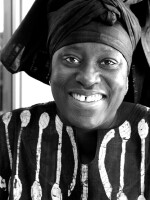Witnesses in Libya and many others are saying that the country's leader, Moammar Gadhafi, has unleashed an army of "mercenaries from Africa" who have been shooting pro-democracy protesters indiscriminately.
"Brother leader," "guide of the revolution" and "king of kings" are some of the titles by which Gadhafi prefers to be addressed in Africa. Libya's relationship with the continent received a boost in the 1980s and '90s when Gadhafi turned his attention to wooing and winning over Africa and began wearing traditional clothing and headgear from south of the Sahara.
His critics accuse him of using the continent like his private fiefdom, waging war on some neighboring countries, meddling in Africa's conflicts, training its rebels and recruiting Africans to join his security forces.
Tuaregs From Mali
"What I know is that thousands of Tuaregs who were enrolled in the pan-Arabic army of Gadhafi were demobilized in the '90s," said Adam Thiam, a political analyst and journalist from Mali, home to the nomadic Tuaregs who also live in other Sahara Desert nations. "Many of them serving in the African legions in Libya came back to Mali and Niger, and they started the rebellion in Mali in June 1990 and a year later in Niger."
But, Thiam says, some fighters stayed behind.
"Ten-thousand — that's the figure which was given to us at the time — remained in Libya, and they are enrolled in the Libyan security forces," he said. "And I was told that 600 of them was forming the special unit in Benghazi, and probably part of this group was used in the repression of the Benghazi movement."
That was in eastern Libya, where the uprising against Gadhafi began.
Developments are hard to confirm, but much has been coming out through social networks, including grainy video clips of gunfire reportedly recorded this week in the heart of the Libyan capital, Tripoli.
Witnesses who spoke to the BBC described brutal tactics in the crackdown by Gadhafi loyalists. Many say mercenaries, speaking foreign languages, opened fire on young protesters.
"He got killed by the Africans who shot him," said one woman who lost a cousin. "Four bullets. We're getting shot at, and we have no protection."
The woman railed about Gadhafi.
"What kind of person brings people from outside of his own country to kill people in their country?" she asked. "If he claims to be Libyan, how can he bring from outside people to shoot and kill? And he knows that his people have nothing — not even weapons."
Fact And Fiction
It's hard to separate fact from fable regarding the definition of foreign mercenaries or whether such hired fighters would be part of an elite unit built up over the years or fresh recruits. Plus, there's confusion about where in Africa they may come from. Their origins vary: Mali, Niger, Chad and Sudan all have been mentioned. The reality is hard to pin down, says Arab affairs specialist Mohamed Yahya.
"The first we heard about the use of foreign mercenaries was last Friday ... that the government has been getting African mercenaries and telling them that they are fighting foreigners, that foreigners have invaded Libya," Yahya said. "Of course, we couldn't verify it."
Thiam, the Malian political analyst, warns that whether they are leftovers from regional civil wars in West Africa or the Sahel, these presumed foreign fighters could spell trouble for countries like his, if Gadhafi is swept out of power in Libya.
"That is exactly what is worrying us in Mali. The Malian authorities have been concerned by this problem for the last 20 years," Thiam said. "In case Col. Gadhafi goes, we don't know what will happen to 10,000 armed Tuaregs. The likelihood for them to come back to Mali is so high that it's frightening."
Copyright 2022 NPR. To see more, visit https://www.npr.org. 9(MDAzMjM2NDYzMDEyMzc1Njk5NjAxNzY3OQ001))






